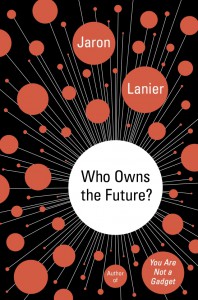I usually do not take notes when reading a book, but Jaron Lanier‘s Who Owns the Future is a delicious collection of insights about our modern world that just begged to be remarked upon. This book had the rare quality of making me rethink my own standpoint about the digital economy.
These days music is more than a need to be met. Musicians who seek to make a living are goaded by the preferences of the marketplace into becoming symbols of a culture or a counterculture. The counter-cultural ones become a little wounded, vulnerable, wild, dangerous, or strange. Music is no longer a nutrient to be supplied, but something more mystical, a forge of meaning and identity: the realization of flow in life.
***
Copying a musician’s music ruins economic dignity. It doesn’t necessarily deny the musician any form of income, but it does mean that the musician is restricted to a real-time economic life. That means one gets paid to perform, perhaps, but not paid for music one has recorded in the past. It is one thing to sing for your supper occasionally, but to have to do so for every meal forces you into a peasant’s dilemma. The peasant’s dilemma is that there’s no buffer. A musician who is sick or old, or who has a sick kid, cannot perform and cannot earn. A few musicians, a very tiny number indeed, will do well, but even the most successful real-time-only careers can fall apart suddenly because of a spate of bad luck. Real life cannot avoid those spates, so eventually almost everyone living a real-time economic life falls on hard times. Meanwhile, some third-party spy service like a social network or search engine will invariably create persistent wealth from the information that is copied, the recordings. A musician living a real-time career, divorced from what used to be commonplace levees like royalties or mechanicals, is still free to pursue reputation and even income (through live gigs, T-shirts, etc.), but no longer wealth. The wealth goes to the central server.
***
Money forgets. Unlike the earliest ancient clay markings, mass-produced money, created first as coins—and much later on a printing press—no longer remembered the story of its individual conception. If we were to know the history of each dollar, the world would be torn apart by war to an even greater degree than it already is, because people are even more clannish than greedy. Money allows blood enemies to collaborate; when money changes hands we forget for at least a moment the history of conflict and the potential for revenge.
***
Liars have to have the best memories. It’s more work to keep two sets of books than one set of books. The plague of toxic assets and mega-pyramid schemes, and the pointless growth spurt of the financial services sector would all have been impossible without vast computational resources remembering and sorting all the details needed to snooker people. The most egregious modern liars not only need computers, they can be inspired by them.
***
In antenimbosian* days, a local baker could deliver fresh bread more readily than a distant bread factory, even if the factory bread was cheaper, and a local banker could discern who was likely to repay a loan better than a distant analyst could. Each person who found success in a market economy was a local star.
Antenimbosian : ‘before the cloud’. What a lovely word!
***
You never know how long it will take for scientific conclusions about big data to form. Science gives up the best punch lines ever, but delivers them with the most inconsistent timing.
***
In either case, once a Siren Server starts to get fooled by phony data, a dance begins. The Server hires mathematicians and Artificial Intelligence experts who try to use pure logic at a distance to filter out the lies. But to lie is not to be dumb. An arms race inevitably ensues, in which the hive mind of fakers attempts to outsmart a few clever programmers, and the balance of power shifts day to day.
Lanier uses the term ‘Siren Server’ for giant corporate farms of computers, that collect freely-volunteered information about our lives without consent, and are now being used for huge financial benefit by a super-rich few. The term “Siren” is used in the Greek mythological sense, and not in the fire-engine sense.
***
Every little genetic feature of you, from the crook of the corner of your eye to much of the way your body moves when you listen to music, was framed and formed by the negative spaces carved out by the pre-reproductive deaths of your would-be ancestors over hundreds of millions of years. You are the reverse image of inconceivable epochs of heartbreak and cruelty.
Just among the many delightful lines Lanier throws in about music and its effect on humankind.
***
We have been obliged to invent our way out of the mess caused by our last inventions since we became human. It is our identity.
***
For better or worse, however, we technologists have made Kirk’s Wager: We believe that all this work will make the future better than the past.
***
Here’s typical advice I’d give to someone who wants to try the Silicon Valley startup game: Obviously you have to get someone else to do something on your server. This can start out as a petty activity. eBay started out as a trading site for people who collected Pez candy dispensers. The key is that it’s your server. If you’re getting a lot of traffic through someone else’s server, then you’re not really playing the game. If you get a lot of hits on a Facebook page, or for your pieces on the Huffington Post, then you are playing a little game, not the big game.
***
These click-through agreements are the grandiosely verbose descendants of the Zen koan about a tree falling in a forest that no one hears. No one will read them, so they are very unlikely to be tested in a legal proceeding. No one wants to read them, not even lawyers. Some lawyer at the Electronic Frontier Foundation or some such place might occasionally be able to make it through one of them, but that is rare. Since they are unread, they basically do not exist, except for setting the basic rule everyone understands, which is that the server takes no risks, only the users of the server.
***
Seeing movies and listening to music suggested to us by algorithms is relatively harmless, I suppose. But I hope that once in a while the users of those services resist the recommendations; our exposure to art shouldn’t be hemmed in by an algorithm that we merely want to believe predicts our tastes accurately. These algorithms do not represent emotion or meaning, only statistics and correlations.
***
The successful guru is neither universally nor arbitrarily scornful to followers, but there should be enough randomness to keep the followers guessing and off guard. When praise comes, it should be utterly piercing and luminous, so as to make the recipient feel as though they’ve never known love before that moment. Apple’s relationship with its customers often followed a similar course.
Jobs imported the marketing techniques of India’s gurus to the business of computation. Another way in which Jobs emulated the practices of gurus is in the psychology of pseudo-asceticism. Consider the way he used physical spaces. Jobs always created both personal and workspaces that were spare like an ashram, but it is the white Apple store interior that most recalls the ashram. White conveys purity, a holy place beyond reproach. At the same time, the white space must be highly structured and formal. There must be a tangible aura of discipline and adherence to the master’s plan.
***
Economics is not about your taste. Economics, once people have risen above basic needs into the middle class, is about the tastes of other people, whether you like it or not. It’s hard to say how much of the present-day economy is based on taste instead of need, since, as Abraham Maslow pointed out, the line shifts. At the very least, not only entertainment, but titanic industries like cosmetics, sports and recreation, tourism, design, fashion, hospitality, dining, hobbies, grooming, cosmetic surgery, and the majority of the activities of geekdom ought to count as “tastes” that have turned into needs as far as commerce is concerned.
***
To survive, the book business has to define a product for the upper horn, for the rich. In the music business, that upper tier takes the form of insanely expensive audiophile equipment and super-high-quality limited editions on vinyl. In the book business, there should be hyperlimited editions of books like this one, hand copied by monks onto handmade paper, using organic fair-trade inks, and sold only in VIP rooms at parties where almost no one can get in.
***
Civilization will remain by definition a mostly voluntary project, a miracle.
***
The book is too idealistic a read, at times. It does not veer into futurism and utopian worldviews, but just barely. Will be interesting to see how its views hold up in a few years.
And finally:
The core ideal of the Internet is that one trusts people, and that given an opportunity, people will find their way to be reasonably decent. I happily restate my loyalty to that ideal. It’s all we have.

